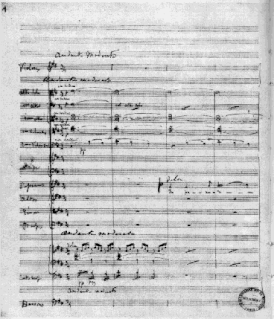
The War Requiem, Op. 66, is a large-scale setting of the Requiem composed by Benjamin Britten mostly in 1961 and completed in January 1962. The War Requiem was performed for the consecration of the new Coventry Cathedral, which was built after the original fourteenth-century structure was destroyed in a World War II bombing raid. The traditional Latin texts are interspersed, in telling juxtaposition, with extra-liturgical poems by Wilfred Owen, written during World War I.

The Requiem in D minor, K. 626, is a requiem mass by Wolfgang Amadeus Mozart (1756–1791). Mozart composed part of the Requiem in Vienna in late 1791, but it was unfinished at his death on 5 December the same year. A completed version dated 1792 by Franz Xaver Süssmayr was delivered to Count Franz von Walsegg, who commissioned the piece for a requiem service to commemorate the anniversary of his wife's death on 14 February.

Gabriel Fauré composed his Requiem in D minor, Op. 48, between 1887 and 1890. The choral-orchestral setting of the shortened Catholic Mass for the Dead in Latin is the best-known of his large works. Its focus is on eternal rest and consolation. Fauré's reasons for composing the work are unclear, but do not appear to have had anything to do with the death of his parents in the mid-1880s. He composed the work in the late 1880s and revised it in the 1890s, finishing it in 1900.

Asger Hamerik (Hammerich), was a Danish composer of classical music.
Andrew Lloyd Webber's Requiem is a requiem mass, which premiered in 1985. It was written in memory of the composer's father, William Lloyd Webber, who died in 1982.

The Requiem, Op. 9, is a setting of the Latin Requiem by Maurice Duruflé for a solo voice, mixed choir, and organ, or orchestra with organ. The thematic material is mostly taken from the Mass for the Dead in Gregorian chant. The Requiem was first published in 1948 by Durand in an organ version.
Rolande Falcinelli was a French organist, pianist, composer, and music educator.

Polish Requiem, also A Polish Requiem, is a large-scale requiem mass for soloists, mixed choir and orchestra by the Polish composer Krzysztof Penderecki. The Lacrimosa, dedicated to the trade union leader Lech Wałęsa, was written for the unveiling of a statue at the Gdańsk Shipyard to commemorate those killed in the Polish anti-government riots in 1970. He expanded the work into a requiem, writing other parts to honour different patriotic events over the next four years. The Polish Requiem was first performed in Stuttgart on 28 September 1984. Penderecki revised and expanded the work in 1993, and expanded it again in 2005 with the additional movement, Ciaccona. It is called Polish Requiem because its parts are dedicated to heroes and victims of Polish history. One of the better-known works by Penderecki, the mass largely follows the liturgical Latin of the requiem format with the addition of Święty Boże, the Polish translation of the Trisagion.

John Rutter's Requiem is a musical setting of parts of the Latin Requiem with added psalms and biblical verses in English, completed in 1985. It is scored for soprano, mixed choir and orchestra or chamber ensemble.

Giacomo Puccini's Messa or Messa a quattro voci is a Mass composed for orchestra and four-part choir with tenor and baritone soloists. Strictly speaking, the piece is a full Mass, not a true Messa di Gloria.
Antonín Dvořák's Requiem in B♭ minor, Op. 89, B. 165, is a funeral Mass scored for soloists, choir and orchestra. It was composed in 1890 and performed for the first time on 9 October 1891, in Birmingham, England, with the composer conducting.
Giovanni Benedetto Platti was an Italian oboist and composer.

François Benoist was a French organist, composer, and pedagogue.
The Requiem in C minor for mixed chorus was written by Luigi Cherubini in 1816 and premiered 21 January 1817 at a commemoration service for Louis XVI of France on the twenty-fourth anniversary of his beheading during the French Revolution.

Thierry Escaich, is a French organist and composer.

The Credo Mass in C major, K. 257, is a mass composed by Wolfgang Amadeus Mozart in 1776. It is scored for SATB soloists, SATB choir, violin I and II, 2 oboes, 2 clarini, 3 trombones colla parte and basso continuo.

Mass No. 1 in F major, D 105, is a mass composed by Franz Schubert in 1814. It is scored for two soprano soloists, two tenor soloists, alto and bass soloists, SATB choir, oboe, clarinet, bassoon, 2 horns, violin I and II, viola, and basso continuo. It was the first of Schubert's masses to be performed, and is of the missa solemnis type.
The Requiem by the Hungarian composer György Ligeti is a large-scale choral and orchestral composition, composed between 1963 and 1965.

The Messa da requiem in D minor (1835) is a musical setting of the Catholic funeral mass (Requiem) by Italian opera composer Gaetano Donizetti. It is scored for five soloists, mixed chorus and orchestra. A performance lasts about 62–75 minutes.

Duruflé: Complete Choral Works is the seventh release by the choral group Houston Chamber Choir performing the unabridged choral works of composer Maurice Duruflé. Conducted by Artistic Director Robert Simpson and performed by organist Ken Cowan, the project is their first to be released under the Signum Classics label. The album won the 2020 Grammy Award for Best Choral Performance.















